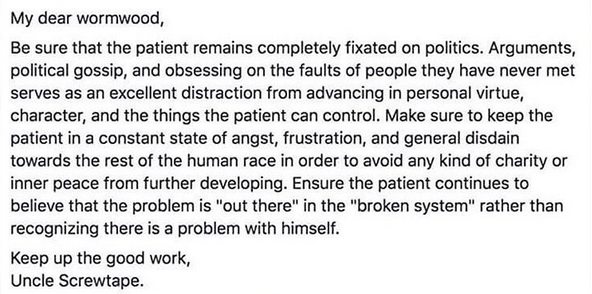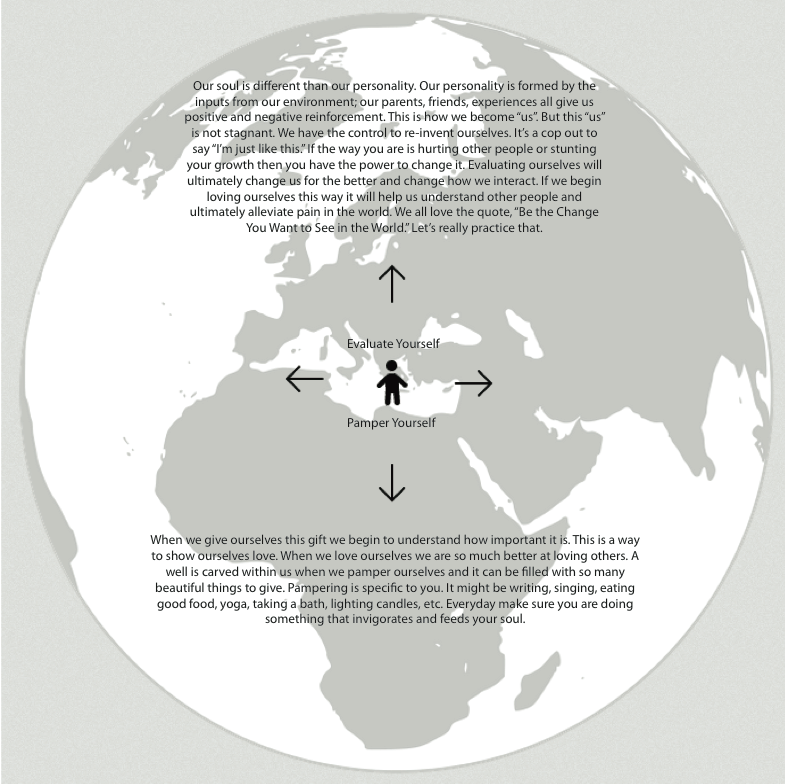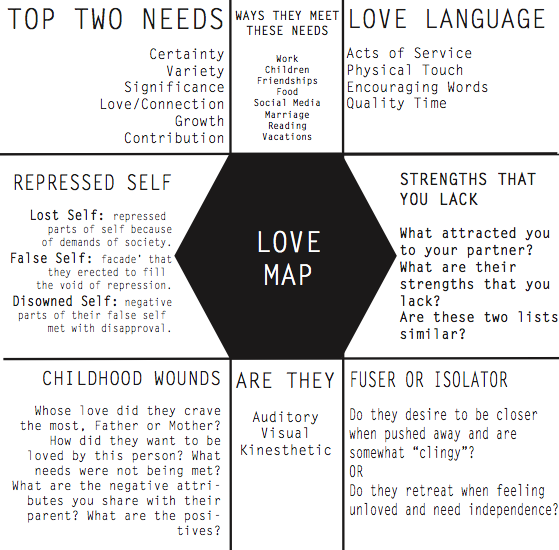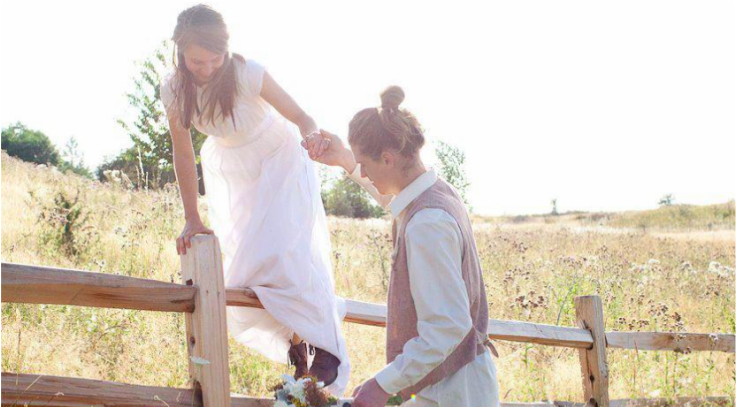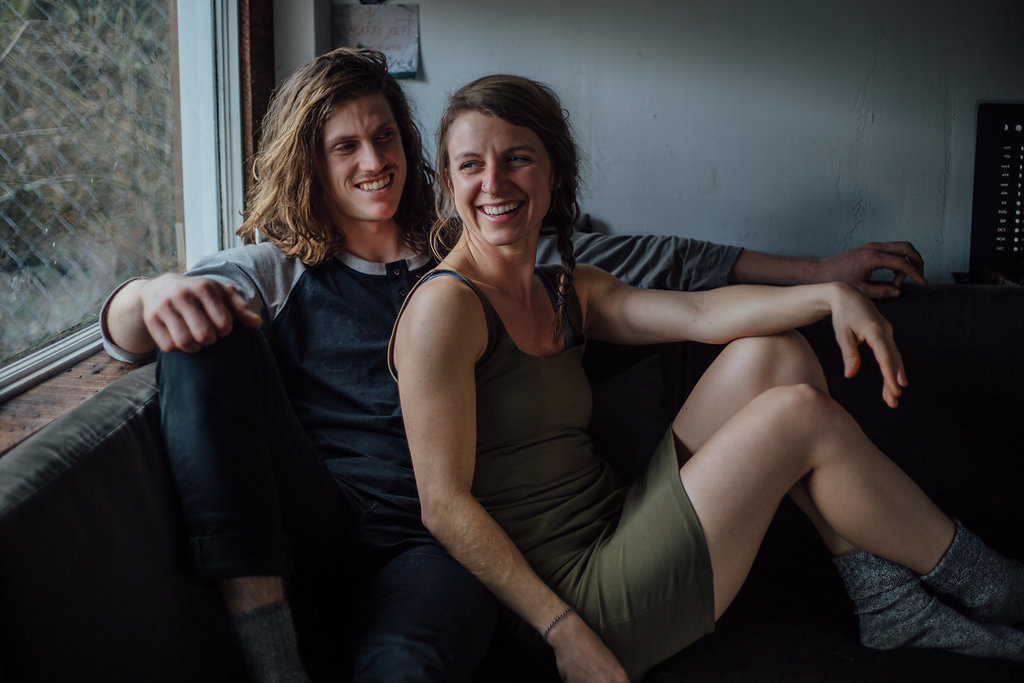|
"Oh what good is it to live With nothing left to give Forgive but not forget Not loving all you see." I came home, doused in the conversations and obligations that others unintentionally put on me, ready to retreat. I am a cave dwelling human. I am one who draws inspiration from images, music and the lonely moments. Loneliness for me is not lonely. My ideal day would be 8 hours alone, 4 hours with Johnny and 1 hour with people. I put every little ounce of myself into carrying out conversations. I've always been hyper aware of the emotions that float invisibly between people conversing. I see beneath things, above words and around the shields people put up. I am best when I am one on one, or leading a group. Trying to maneuver within a group is when I am most uncomfortable and when I become most exhausted.
This is why I call myself the Queen of Self Care. When I was younger I did this naturally. I poured heavily into myself. I took care of my mental health and later on my physical body. I didn't think much of it, not until recently. I spent the first 6 years of my marriage doing the opposite. Trying to take care of people, be around people and lay down my desires. This created sickness within me, as these things do. This last year I have re-invigorated Bailey. Write your name down: BAILEY. What does your name evoke in you? Who are you? What do you love? Forget everything you've learned. Forget all the expectations. Who is Bailey? (insert your name) A lot of this re-emerged after my first 45 hour work week. I took a holiday job so Johnny and I can continue to pay our mortgage without dipping into savings. My winter season is always slow so it seemed like a good idea. As this week came to a close I had a plethora of emotions. I've mentioned how many hours I worked to a lot of people who seemed to think this was normal. I started to think...maybe I'm being weak? I had to remind myself that 45 hours of doing something that I love, something that has meaning to me and invigorates me would be so much different than 45 hours of working for someone else doing things that have no relation to my life besides bringing in a little bit of money. I know that a lot of us have no choice...or at least it would take us a while to work toward something else, but I can't help but think we've created a culture that sucks the life out of us. This last week I woke and left for work while it was dark. Then there was the 9 hours in a corner with no window starting at a screen. By the time I got home, it was dark again. This breeds insanity. I know so many people do it. I came home exhausted, unable to even do the things I loved in my last hours of the day, unable to cook a great meal, unable to clean. For me this isn't just the "work" it's my introverted nature being bombarded for 9 hours of my day while working. I gave myself some grace instead of feeling like I was weak. I honestly don't think it is good for anyone to work like this. As humans we are meant to have a certain amount of freedom, expression, natural light, movement, fresh air and taking part in things that make us come alive. The common workplace does not breed this. So how could we support the 40+ hour workers? It got me thinking...what if I worked with corporations and businesses to create better working environments? My Wellness Coaching (as I call it) could be used so well in these situations. I've decided that for the next month I will work this job as an experiment, as a way of understand others, gaining empathy and dreaming up ideas for the common worker. The business I am working for already has a few things in place, like morning and afternoon stretching as a group. I love that! I'm taking my introverted little self on another adventure into discomfort to discover more, create more, do more. I will post a part two after the month is over. In the meantime, take care of yourselves! It's the best thing you can do. -Bailey
0 Comments
Instead of focusing on all the negative things let us pour into ourselves so we may pour into others. That's the deepest change to be made. Evil is a collective of actions that come out of people who don't know themselves, who have been hurt, who have not been taken care of and who do not take care of themselves. We must take care of ourselves first. When a plane goes down you always put your oxygen mask on first before helping others. Be the Change people. Be the Change. Much of our personality can be attributed to the feedback we received as children. Throughout our most formative years we look to those around us to determine how to survive in the world. Thus, we are shaped by the positive and negative reinforcement we receive. While this process occurs everyday, even in our adult life, it is during the early years of life that these patterns seem to become most deeply embedded.
As I’ve sought to understand my habits, temperament, and coping mechanisms, I’ve set my gaze upon my earliest memories. As I’ve done so, I have discovered one important example of contradictory feedback that I faced regularly. The majority of positive feedback I got centered on my intellect. Labels like smart, intelligent, gifted, and excellent student were often applied to me. Conversely, I was often told I was arrogant, conceited, and a smart-ass. Essentially, as soon as I began to believe the positive reinforcement I was given, I was beaten back down. My older brothers were recipients of nearly identical treatment in the arena of athletics. Being exceptional athletes, they were regularly praised for their abilities. Yet, the more successful they were in such undertakings, the deeper entrenched became their reputation as arrogant, conceited, and hotheaded. The result of this external conflict has been considerable internal conflict. One memory in particular made a substantial impact. Near the beginning of the sixth grade, I was quite interested in a girl. As sixth graders do, instead of talking to her directly, I sought information from her close friend. Upon inquiring as whether or not I stood a chance with this girl, I was told that she felt I was conceited. I know that was the exact word she used, as I remember having to ask what it meant. “It means being full of yourself,” she said. This came as quite a blow at the time. Since then I have gone to great lengths to avoid giving even the faintest trace of that impression. The resulting behaviors have done little to serve me in achieving my goals and realizing my potential. I have generally avoided doing anything that might be perceived as a request for attention or acknowledgement. Being the center of attention was simply not allowed. The repercussions of this fear have been far reaching, dramatically reducing my self-esteem, and affecting the way I speak, dress, and interact with others. I see this pattern play itself out in my life on a regular basis. When our friends come to us, seeking our help in overcoming an obstacle, we don’t hesitate to pour on the encouragement. We shower them with praise, extolling their strengths, past successes, and positive qualities. Should they begin to believe us, we are often ready with harsh criticism. We certainly wouldn’t want it to go to their heads, would we? I’ve often felt that the only people who are allowed to like themselves are the underdogs. I certainly agree that we should rally around such people, providing them the positive reinforcement that they possibly never received. Yet, as a person of immense privilege and natural talent, I have believed for most of my life that I do not deserve to be happy, or to love myself. If encouragement is a limited resource, let’s save it for those who need it most. My hope is simply that we can learn to look for reasons to corroborate any evidence of self-confidence we see in others. I believe this would be a far more life-giving approach than succumbing to the fear that someone might begin to believe that they are more capable than they actually are. If we made a little room for some seemingly grandiose beliefs, they might just turn out to be true. It turns out that what one achieves in life is closely related to what they believe they can achieve. As its been said, “Whether you believe you can or you can’t, you’re right.” -Johnny Put two people together with different backgrounds, different childhoods and different sexes (for some) and see what happens. This sounds like a crazy experiment and yet so many of us embark on this journey. This is life partnership. My introduction in Part One describes it as a spiritual journey to wholeness. That sounds nice, doesn't it? But it isn't nice sometimes. It requires incredibly understanding, patience and fervor. This is why I began developing The Love Map. There are so many unspoken, subconscious dialogues taking place whenever we interact with our partner. There are influences from our childhood, our past experiences, our positive and negative reinforcements and on and on and on. We are a cluster of inputs which can create some confusing outputs for a person who didn't go through the same things we did. This is the reality of being different people. So how do we start practicing deep understanding in our relationship with all these unspoken rules and triggers? This is where the map comes in: As I've studied psychology and intervention coaching there has been a common theme.
The Human Needs. This is where my map starts. Once you understand what needs the other is most trying to meet in their day to day life it unveils more about the person, their words and their actions. So the next part would be discovering how they already meet those needs. Ways They Meet Their Needs. Next we can discover how they receive and give love using their Love Language There is also the idea that you are attracted to a someone who has Strengths You Lack If we understand what needs they are trying to meet, how they are trying to meet them, how they desire to be loved and admire what strengths they have that we don't then we also should understand how they act when stressed and if they are a Fuser or Isolator On a really basic level we can add to our understanding of giving love and attention when we ask Are They: Auditory, Visual or Kinesthetic? An incredible, eye opening exercise would be to understand whose parental love did they crave the most, who did they have to be for that person, what kind of love was withheld. And what positive/negative attributes do you as a partner share with their parents. This is all about Childhood Wounds And finally you must discover their lost self, false self and disowned self. Their lost self would be the part that was discouraged by parents or societal demands. Their false self would be what they erected to fill the voids that their lost self would have taken up. Their disowned self are the behaviors that came out of erecting the false self, these could be seen as coping mechanisms or other negative reactions that have been bred in us. They are so offensive to us that we pretend like they aren't there. We disown them. This is the Repressed Self Once you understand these parts of yourself, and your partner, understanding begins to grow. You see your partner as a wounded child and you begin to understand why they do the things they do. Their little idiosyncrasies, habits, criticisms and actions begin to make more sense. Once you understand how to love them you can help them grow and visa versa. Putting this much effort into creating a Love Map is an incredibly way to have a thriving relationship. Don't get me wrong, bringing this stuff to the surface is hard. It's not, "here's who I am and how to love me." DONE! It can be painful and you might flounder around as you process and put into practice. More on that in Part Three. “When we gather the courage to search for the truth of our being and the truth of our partners being, we begin a journey of psychological and spiritual healing.” -Harville Hendrix When we see marriage as a spiritual journey to wholeness it can change everything. When both partners enter their marriage this way or come to realize it later on it can have profound effects on their relationship.
So often we work hard on our career or other endeavors in life, why is it that we don’t view marriage as something to challenge us, help us grow and become whole? Why do we give up? We need to look into our past, our childhood, and discover how we were denied adequate nurturing and how we repressed essential parts of our self. It’s as if our parents pass us off to our spouse so they can finish the work that was started. The more dysfunctional the family of origin, the more intentional the communication and action must be in the marriage. We can do this searching through self-reflection, journaling, therapy or whatever avenue makes sense to you. As we discover new things about ourselves we can share them with our partner to start building a new way of interacting. Every single day Johnny and I share new things with one another and calibrate accordingly. Some people might say, “My partner doesn’t listen to me" or you don’t feel comfortable sharing with them. In this case trust must be built first. Marriage remains stagnant without trust, openness and vulnerability. We can start by “going first”. When our partner reveals anything about themselves, no matter how small, we must respond with understanding and compassion in order to start building the trust from our end. As we build our Love Map (a concept I will describe in Part Two) we will inevitably find ways to love our partner in the way they desire so deeply. Even the most stubborn, elusive partner will soften when their needs are being met on the deepest level. We’ll actually start to see them as “wounded children” whom we can heal with our unconditional love. Stay Tuned for Part Two. |
Details
Bailey Patrice & Jonathan DavidCategories
All
Date
December 2017
|
